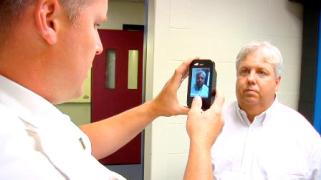This is one of those posts where I thought, why hasn’t anyone in the tactical industry or law enforcement industry developed a mobile app that can convert your smart phone into a 2 way radio? Because according to this article, private industry has already created three mobile apps that turn your phone into a basic 2 way radio.
So for this post, the idea is basic. Create a similar 2 way radio mobile app, but ‘tactify’ it. lol Get it encrypted and secure, and give it functions that would be applicable to military/police/contractor uses. Or just have basic switches on the mobile app that allow a user to customize the app to suite their needs.
The top mobile app for turning your smart phone into a basic 2 way radio according to this article below is Voxer Walkie-Talkie. If you would like to play around with it, and maybe use it for hunting or none tactical purposes, here is a link to check it out. Here it is on iTunes, and below is the description of what it does.
Description
Featured by Apple in 50+ countries
Turn your phone into a Walkie Talkie.
Don’t waste time on phone calls and voicemails.
Voxer® is a Walkie Talkie app for smartphones. Send instant Audio, Text, Photo and Location messages to one friend or a group of your friends. Your friends can listen to your message while you talk or check it out later.
-LIVE WALKIE TALKIE
-Cross Platform Messenger
-VOICE, TEXT, PHOTOS and LOCATION
-GROUP CHATS
-EVERYTHING is FREE
-No annoying advertisements
-Works over WiFi, 3G and any other data network
-Get notifications for new messages
-Create messages even offline
-Play voice messages faster
-Connect with Facebook friends on Voxer
Voxer turns your iPhone/iPad/iPod touch device into the ultimate Push To Talk (PTT) real-time Walkie Talkie.
The other thing I was thinking about with a Tactical Radio Mobile App is that companies could save money by not having to buy expensive handheld two way radios. They could just depend upon an internet connection locally or 3G/data networks, and have a team work off of that. So instead of depending upon a repeater, you are depending upon a diversified array of ‘repeaters’. Or you could have this as your back up to your pre-existing communications system.
Another angle is to create a Garmin Rhino style mobile app. Something that turns your smart phone into a basic Garmin Rhino, complete with blue force tracker style capability and two way radio functionality.
On the downside would be battery life. So along with the mobile app, you would probably have to get hardened cases with extra battery juice installed, to further extend the radio’s life and durability through a shift. Although I think the market has plenty of sources for this type of thing. I would think a power source that would give your phone enough juice to last a 12 hour shift would be acceptable. Rechargeable would be necessary as well. Pretty neat and I hope someone out there is able to take this idea and run with it. Maybe do a kickstarter for it? –Matt

Smartphone? Presto! 2-Way Radio
By DAVID POGUE
September 5, 2012
Cave drawings, smoke signals, letters, Pony Express, telegrams, phone calls, text messages. From the dawn of civilization, man has experimented with different modes of communication, each with pros and cons. Smoke signals, for example, contribute to far fewer car accidents than text messages. Text messages, on the other hand, leave much less soot.
You might think that we’ve exhausted every variation on electronic communication — text, audio, video — but you’d be wrong. A new one is quietly winning over millions of gadget fans. They’re free apps with names like Voxer, HeyTell and Zello, and they really do mess with the rules of the game.
Nobody’s settled on a good name for this communications category. But if we call them voice-texting apps, or walkie-talkie apps, you’ll get the idea.
They work on iPhones, iPads, iPod Touches, Android phones and Windows phones. You open the app, tap someone’s name, hold down the big Talk button and speak. A second after you start talking — yes, even before you’re finished — your voice bursts to life, extremely clearly, on your friend’s phone, wherever it may be in the world.
Your buddy can respond to you by pressing his own Talk button, and the conversation is under way.
Now, before you roll your eyes — “These youngsters today! Why do they need so many different ways to talk!?” — consider all the ways these apps improve on existing modes of chat.

